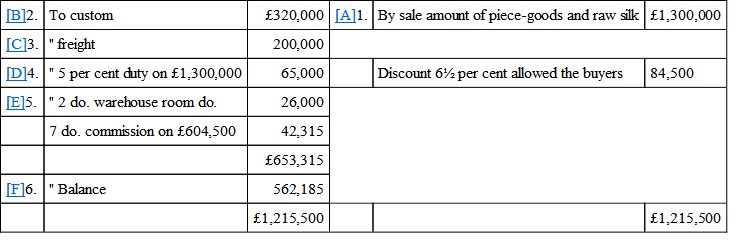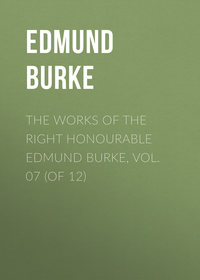
The Works of the Right Honourable Edmund Burke, Vol. 08 (of 12)
That the said Hastings did not only disable the Resident at Furruckabad by his said prohibitory letter, but did render his very remaining at all in that station perfectly precarious by a subsequent letter, rendering him liable to dismission by the Vizier,—thereby changing the tenure of the Resident's office, and changing him from a minister of the Company, dependent on the Governor-General and Council, to a dependant upon an unresponsible power,—in this also acting without the Council, and by his own usurped authority: and accordingly the said Resident did declare, in his letter of the 24th of April, 1785, "that the situation of the country was more distressful than when he [the prince of Furruckabad] addressed himself for relief in 1783, and that he was sorry to say that his appointment at Furruckabad was of no use"; that, though the old tribute could not be paid, owing to famine and other causes, it was increased by a new imposition, making the whole equal the entire gross produce of the revenue; that therefore there will not be "anything for the subsistence of the Nabob and family." And the uncles of the said Nabob of Furruckabad, the brethren of the late Ahmed Khân, (who had rendered important services to the Company,) and their children, in a petition to the Resident, represented that soon after the succession of Muzuffer Jung "their misery commenced. The jaghires [lands and estates] on which they subsisted were disallowed. Our distress is great: we have neither clothes nor food. Though we felt hurt at the idea of explaining our situation, yet, could we have found a mode of conveyance, we would have proceeded to Calcutta for redress. The scarcity of grain this season is an additional misfortune. With difficulty we support life. From your presence without the provinces we expect relief. It is not the custom of the Company to deprive the zemindars and jaghiredars of the means of subsistence. To your justice we look up."
This being the situation of the person and family of the Nabob of Furruckabad and his nearest relations, the state of the country and its capital, prevented from all relief by the said Warren Hastings, is described in the following words by the Resident, Willes.
"Almas Ali has taken the purgunnah of Marara at a very inadequate rent, and his aumils have seized many adjacent villages: the purgunnahs of Cocutmow and Souje are constantly plundered by his people. The collection of the ghauts near Futtyghur has been seized by the Vizier's cutwal, and the zemindars in four purgunnahs are so refractory as to have fortified themselves in their gurries, and to refuse all payments of revenue. This is the state of the purgunnahs. And Furruckabad, which was once the seat of great opulence and trade, is now daily deserted by its inhabitants, its walls mouldering away, without police, without protection, exposed to the depredations of a banditti of two or three hundred robbers, who, night after night, enter it for plunder, murdering all who oppose them. The ruin that has overtaken this country is not to be wondered at, when it is considered that there has been no state, no stable government, for many years. There has been the Nabob Vizier's authority, his ministers', the Residents' at Lucknow, the sezauwils', the camp authority, the Nabob Muzuffer Jung's, and that of twenty duans or advisers: no authority sufficiently predominant to establish any regulations for the benefit of the country, whilst each authority has been exerted, as opportunity offered, for temporary purposes.
"Such being the present deplorable state of Furruckabad and its districts, in the ensuing year it will be in vain to look for revenue, if some regulations equal to the exigency be not adopted. The whole country will be divided between the neighboring powerful aumils, the refractory zemindars, and banditti of robbers; and the Patans, who might be made useful subjects, will fly from the scene of anarchy. The crisis appears now come, that either some plan of government should be resolved on, so as to form faithful subjects on the frontier, or the country be given up to its fate: and if it be abandoned, there can be little doubt but that the Mahrattas will gladly seize on a station so favorable to incursions into the Vizier's dominions, will attach to their interests the Hindoo zemindars, and possess themselves of forts, which, with little expense being made formidable, would give employment perhaps to the whole of our force, should it be ever necessary to recover them."
That the Council at Calcutta, on the representation aforesaid made by the Resident at Furruckabad, did propose and record a plan for the better government of the said country, but did delay the execution of the same until the arrangements made by the said Hastings with the Nabob Vizier should be known; but the said Hastings, as far as in him lay, did entirely set aside any plan that could be formed for that purpose upon the basis of a British Resident at Furruckabad, by engaging with the said Nabob Vizier that no British influence shall be employed within his dominions, and he has engaged to that prince not to abandon him to any other mode of relation; and he has informed the Court of Directors that the territories of the Nabob of Oude will be ruined, if Residents are sent into them, observing, that "Residents never will be sent for any other purposes than those of vengeance and corruption."
That the said Warren Hastings did declare to the Court of Directors, that in his opinion the mode of relief most effectual, and most lenient with regard to Furruckabad, would be to nominate one of the family of the prince to superintend his affairs and to secure the payments; but this plan, which appears to be most connected with the rights of the ruling family, whilst it provides against the imbecility of the natural lord, and is free from his objection to a Resident, is the only one which the said Hastings never has executed, or even proposed to execute.
That the said Hastings, by the agreements aforesaid, has left the Company in such an alternative, that they can neither relieve the said prince of Furruckabad from oppression without a breach of the engagements entered into by him, the said Hastings, with the Nabob Vizier in the name of the Company, nor suffer him to remain under the said oppression without violating all faith and all the rules of justice with regard to him. And the said Hastings hath directly made or authorized no less than six revolutions in less than five years in the aforesaid harassed province; by which frequent and rapid changes of government, all of them made in contradiction to all his own declared motives and reasons for the several acts successively done and undone in this transaction, the distresses of the country and the disorders in its administration have been highly aggravated; and in the said irregular proceedings, and in the gross and complicated violations of faith with all parties, the said Hastings is guilty of high crimes and misdemeanors.
VI.—DESTRUCTION OF THE RAJAH OF SAHLONE
I. That the late Nabob of Oude, Sujah ul Dowlah, did (on what reasons of policy or pretences of justice is unknown) dispossess a certain native person of distinction, or eminent Rajah, residing in the country of Sahlone, "the lineal descendant of the most powerful Hindoo family in that part of Hindostan," of his patrimonial estate, and conferred the same, or part of the same, on his, the Nabob's, mother, as a jaghire, or estate, for the term of her life: and the mother of the Nabob, in order to quiet the country, and to satisfy in some measure the principal and other inhabitants, did allow and pay a certain pension to the said Rajah; which pension, on the general confiscation of jaghires, made at the instigation of the said Warren Hastings, and by the letting the lands so confiscated to farmers at rack-rents, was discontinued and refused to be paid; and the discontinuance of the said pension, "on account of the personal respect borne to the Rajah, (as connections with him are sought for, and thought to confer honor,)" did cause an universal discontent and violent commotions in the district of Sahlone, and other parts of the province of Oude, with great consequent effusion of blood, and interruption, if not total discontinuance, to the collection of the revenues in those parts, other than as the same was irregularly, and with great damage to the country, enforced by British troops.
II. That Mr. Lumsdaine, the officer employed to reduce those disordered parts of the province to submission, after several advantages gained over the Rajah and his adherents, and expelling him from the country, did represent the utter impossibility of bringing it to a permanent settlement "merely by forcible methods; as in any of his [the Rajah's] incursions it would not be necessary to bring even a force with him, as the zemindars [landed proprietors and freeholders] are much attached to the Rajah, whom they consider as their hereditary prince, and never fail to assist him, and that his rebellion against government is not looked on as a crime": and Mr. Lumsdaine declared it "as his clear opinion, that the allowing the said Rajah a pension suitable to his rank and influence in the country would be the most certain mode of obtaining a permanent peace,"—alleging, among other cogent reasons, "that the expense of the force necessary to be employed to subdue the country might be spared, and employed elsewhere, and that the people would return to their villages with their cattle and effects, and of course government have some security for the revenue, whereas at present they have none." And the representation containing that prudent and temperate counsel, given by a military man of undoubted information and perfect experience in the local circumstances of the country, was transmitted by the Resident, Bristow, to the said Warren Hastings, who did wilfully and criminally omit to order any relief to the said Rajah in conformity to the general sense and wishes of the inhabitants, a compliance with whose so reasonable an expectation his duty in restoring the tranquillity of the country and in retrieving the honor of the English government did absolutely require; but instead of making such provision, a price was set upon his head, and several bodies of British troops being employed to pursue him, after many skirmishes and much bloodshed and mutual waste of the country, the said Rajah, honored and respected by the natives, was hunted down, and at length killed in a thicket.
1
See the Secret Committee's Reports on the Mahratta War.
2
Vide Secret Committee Reports.
3
Vide Select Committee Reports, 1781
4
The sale, to the amount of about one hundred thousand pounds annually, of the export from Great Britain ought to be deducted from this million.
5
Estimate of the Sale Amount and Net Proceeds in England of the Cargoes to be sent from Bengal, agreeable to the Plan received by Letter dated the 8th April, 1782.
This calculation supposes the eighty lac investments will be equal to the tonnage of five ships.

[A] 1. The sale amount is computed on an average of the sales of the two last years' imports.
[B] 2. The custom is computed on an average of what was paid on piece-goods and raw silk of said imports, adding additional imposts.
[C] 3. The ships going out of this season, (1782,) by which the above investment is expected to be sent home, are taken up at 47l. 5s. per ton, for the homeward cargo; this charge amounts to 35,815l. each ship; the additional wages to the men, which the Company pay, and a very small charge for demurrage, will increase the freight, &c., to 40,000l. per ship, agreeable to above estimate.
[D] 4. The duty of five per cent is charged by the Company on the gross sale amount of all private trade licensed to be brought from India: the amount of this duty is the only benefit the Company are likely to receive from the subscription investment.
[E] 5. This charge is likewise made on private trade goods, and is little, if anything, more than the real expense the Company are at on account of the same; therefore no benefit will probably arise to the Company from it on the sale of the said investment.
[F] 6. This is the sum which will probably be realized in England, and is only equal to 1s. 6d. per rupee, on the eighty lacs subscribed.
6
Vide Mr. Francis's plan in Appendix, No. 14, to the Select Committee's Sixth Report.
7
The whole sum has not been actually raised; but the deficiency is not very considerable.
8
Fourth Report, page 106.
9
Par. 36. Vide Fourth Report from Com. of Secrecy in 1773, Appendix, No. 45.
10
Vide Sel. Letter to Bengal, 17 May, 1766, Par. 36, in Fourth Report from Com. of Secrecy, in 1773, Appendix, No. 45.
11
Ibid. Par. 37.
12
Vide Committee's Fifth Report, page 21, and Appendix to that Report, No. 12.
13
1st and 5th April, 1779.
14
Appendix B. No. 1.
15
Vide Supplement to the Second Report, page 7.
16
Appendix. B. No. 2.
17
Vide Appendix B. No. 1.
18
Appendix B. No. 7.
19
Appendix B. No. 3 and No. 5.
20
Appendix B. No 6.
21
Vide Larkins's Affidavit, Appendix B. No. 5.
22
Vide Appendix B. No. 1.
23
Vide Appendix B. No. 1.
24
Ibid.
25
Ibid., No. 8.
26
Ibid., No. 1.
27
Ibid., No. 4.
28
Appendix B. No. 8.
29
Ibid.
30
Ibid., No. 9.
31
Appendix B. No. 1.
32
Ibid.
33
Ibid., No. 8.
34
Appendix B. No. 4: The Governor-General's Account of Moneys received, dated 22d May, 1782. Also, Appendix B. No. 9: The Auditor's Account of Bonds granted to the Governor-General.
35
Vide Appendix B. No. 4.
36
Vide Mr. Hastings's Account, in Appendix B. No. 4.
37
Vide Hastings's Account, dated 22d May, 1782, in Appendix B. No. 4.
38
Vide above Appendix, and B. No. 2.
39
Vide above Appendix.
40
Vide Appendix B. No. 4.
41
Vide Appendix B. No. 6.
42
Ibid., No. 7.
43
Vide Appendix B. No. 6.
44
Ibid.
45
Act 13 Geo. III. cap 63.
46
Vide Mr. Hastings's Letter of 16 December, 1782, in Appendix B. No. 6.
47
Vide Appendix B. No. 6.
48
Vide Appendix B. No. 3.
49
Ibid.
50
Ibid.
51
Vide Appendix B. No. 3.
52
Vide Appendix B. No. 3.
53
Ibid.
54
Ibid., No. 6.
55
Vide Appendix B. No. 6.
56
Relative to salt farms, charges of the Ranny of Burdwan, and the charges of Nundcomar and Munny Begum.
57
As the Appendixes originally printed with the foregoing Reports, and which consist chiefly of official documents, would have swelled this volume to an enormous size, it has been thought proper to omit them, with the exception of the first nine numbers of the Appendix B. to the Eleventh Report, the insertion of which has been judged necessary for the elucidation of the subject-matter of that Report.
58
See Hastings's Letter.
59
Sic orig.
60
26th Dec., 1781.
61
13th Jan., 1782.
62
18th Jan., 1782.
63
Letter from Mr. Middleton, 2d Feb., 1782.
64
Lucknow, 22d July, 1782.
65
Major Gilpin's Letter, 15th June, 1782.
66
Mr. Johnson's letter, 9th July, 1782.
67
Ibid., 4th July, 1782.
68
Major Gilpin's Letter, 6th July, 1782.
69
Mr. Johnson's Letter, 22d July, 1782.
70
Major Gilpin's Letters, 16th June and 15th Sept., 1782.
71
Major Gilpin's letter, 15th Sept., 1782.
72
Major Gilpin's letter, 19th Oct., 1782.
73
Major Gilpin's Letter, 18 Nov., 1782.
74
Mr. Bristow's Letter, 2d Dec., 1782.
75
Mr. Bristow's Letter, 12 Dec., 1782.
76
Shoka from the Vizier to Hyder Beg Khân, 2d Ramsur, 1197
77
Bristow's Letter, 29th Jan., 1784, with inclosures.









